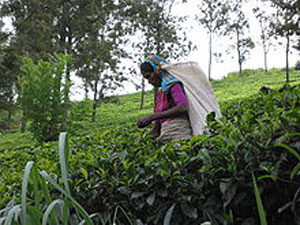A string of new regulations, including regulations to make tea re-planting mandatory and to set up a marketing system for Ceylon Tea, are lined up for the plantation sector, the Minister of Plantation Industries, Mahinda Samarasinghe, announced last week at the Annual General Meeting of the Planters’ Association of Ceylon in Colombo. The government is also offering incentives to expand coconut, rubber and oil palm cultivation.
New regulations are to come into force from November 1, to develop an international marketing strategy for Ceylon Tea. The marketing drive will be backed by a budget of Rs 1 billion per year, over a period of five years. “We have reached an agreement with exporters and we are formulating regulations that will come into practice from November 1, to get Rs 1 billion per year, for five years, for a dynamic marketing strategy for Ceylon Tea,” Minister Samarasinghe told plantation sector representatives.
 Re-planting laws Re-planting laws
Another set of regulations will make re-planting compulsory in the tea sector. Due to the high cost, re-planting in Sri Lanka’s tea plantations is below the required level. This, in turn, is lowering the quality of Ceylon Tea.
“Replanting is an absolute pre-requisite for the tea industry and also infilling. I am in the process of framing regulations that will make 2% - 3% of re-planting compulsory. Without this, we can kiss the good name of Ceylon Tea goodbye in a few years. So I will not compromise on the re-planting and infilling,” said the Minister. The Minister told the Regional Plantation Companies (RPCs) that investments in re-planting will also help with extending their lease agreement with the government.
“Re-planting and infilling are important to extend your lease agreements as well. The plantations are still owned by the people. You are managing it. But while you are making your profits there must be an investment in the plantations as well, so that at some point, when they are handed back to the people of this country, they are in productive form. They can’t be rundown when you hand them back,” the Minister told the plantation industry gathering.
With re-planting laws taking root, the Plantation Ministry is considering a concessionary loan scheme to help RPCs finance the re-planting. The Ministry is also developing a subsidy scheme for small holders and is looking into interim income generation schemes for smallholders.
Growing plantations
On the production side, the government is pushing rubber and coconut cultivation into the war-recovering North, and is also targeting increased oil palm extent. Oil palm is now slowly edging its way into Sri Lanka’s traditional tea, rubber and coconut plantation sector, with some plantation companies allocating a few acres for the newcomer. However, now, the government has also taken an interest in the new crop because of its higher income generating possibilities and because of the growing consumer demand for edible oils. The government has already laid the groundwork for oil palm cultivation and is urging RPCs to get into the business.
“I am encouraging RPCs to go into oil palm. We will facilitate you. We have identified 4,500 hectares as suitable and more lands will be identified. We have already started a special ‘oil palm unit’ at the Coconut Research Institute as well. So now you have scientists to support you. We are also getting ready to start our own seed nurseries. Until then, we will bring the seed from Indonesia,” said Minister Samarasinghe.
Coconut cultivation is also earmarked for expansion, to feed growing domestic demand. As much as 70% of Sri Lankan coconuts are consumed by households. This domestic appetite for coconut is pushing up prices of coconuts and coconut oil. The supply gap is also helping imported products, such as imported palm oil, capture bigger chunks of the domestic market. So the government is trying to get plantation companies to start coconut cultivation in the North.
“We have identified about 100,000 acres in the North, in Kilinochchi and Mullaitivu, ideal for coconut. The war has destroyed the trees but the ground is ideal. We urge the private sector to look into this,” said Mr Samarasinghe.
Rubber lands too, are to stretch North and into other parts of the country. “The Rubber Research Institute has identified areas in the North, like Vavuniya, that are suitable for rubber cultivation. Rubber cultivation in places like Moneragala will also be fast tracked and other suitable lands for rubber will also be made available for you,” said the Minister.
With many other new initiatives underway targeting the plantation sector, the Minister called on the private sector to participate and to support the government in its development drive. |

 Re-planting laws
Re-planting laws